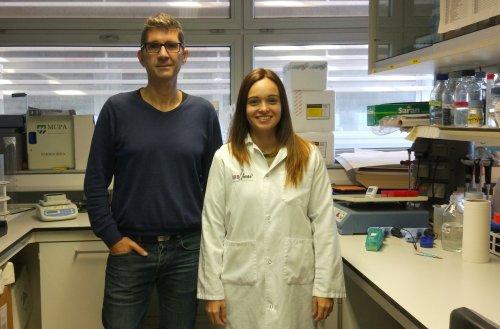Lleida researchers discover a genetic relationship between cardiovascular function and Alzheimer's disease
The study opens the door to new therapeutic strategies to combat Alzheimer's and other dementias
The Biomedical Research Institute of Lleida (IRBLleida), the University of Lleida (UdL), the Andalusian Center for Bioinformatics Studies of Seville (CAEBI) and the ACE-Barcelona Alzheimer Treatment & Research Center have discovered the existence of a genetic relationship between changes in the functioning of the cardiovascular system and the development of Alzheimer's disease. The study, which has just been published by the prestigious scientific journal Scientific Reports of the Nature Group, has been carried out based on the genetic samples of more than 11,500 people, of which data related to heart function and 12,700 patients are also available. of Alzheimer's and control individuals.
The article is part of an investigation led by IRBLleida researcher and UdL professor Daniel Sanchis who received funding from La Marató de TV3 in 2014, in an edition dedicated entirely to research on heart ailments. Specifically, 191,626.25 euros. The experience in genetic analysis and Alzheimer's disease of CAEBI and the ACE Foundation has been added to the biological knowledge of the IRBLleida cardiovascular system.
The study has allowed to identify a series of genes, among which are some apoptotics (related to programmed cell death), which present changes to their sequences associated with both the development of Alzheimer's disease and alterations in cardiac parameters: size of the left atrium, root diameter of the aortic artery, mass of the left ventricle, wall thickness of the left ventricle and the diameter of the left ventricle in diastole.
New step towards the cure of neurodegenerative ailments
Dr. Agustín Ruiz, head of research at ACE Foundation, stressed that "the results of this study open a new door for us to advance the fight against Alzheimer's disease and allow us to develop new therapeutic strategies that can be key to finding a cure. of the ailment."
For now, there is no effective treatment to combat neurodegenerative ailments, therefore, entities such as the ACE Foundation, dedicated in search of these pathologies, defend the importance of continuing to do research as the only way to end dementia.
In this sense, genetic research is considered one of the decisive methods on the path to cure. Because this type of research is possible, the collaboration of citizens is essential: "It is thanks to the generosity of all the people who in a selfless and altruistic way give us their samples that we can continue progressing in this struggle to make Alzheimer's history" , says Dr. Ruiz.
For his part, Dr. Daniel Sanchis, responsible for the research group Cellular Signaling and Apotosi, stressed that "research, which has contributed to a better understanding of the biology of the heart, supports a new vision of the origin and/or the development of Alzheimer's disease, involving the cardiovascular system. " A new perspective that has revealed a possible genetic link and, therefore, hereditary, which relates the way in which blood circulates in a person with the tendency to develop Alzheimer's disease, has qualified Sanchis.
As the researchers indicate, these results have to be replicated in larger data sets to confirm the effects observed in the associated genes.
Reference Article:
Genome Wide Meta-Analysis identifies common genetic signatures shared by heart function and Alzheimer's disease. I . Sáez, A. González-Pérez, B. Hernández-Olasagarre, A. Beà, S. Moreno-Grau, I. de Rojas, G. Monté-Rubio, A. Orellana, S. Valero, JX Comella, D. Sanchís, A. Ruiz & For the Alzheimer's Disease Neuroimaging Initiative. Scientific Reports

The article is part of an investigation led by IRBLleida researcher and professor of the UdL Daniel Sanchis who received funding from La Marató de TV3 in 2014






